Taiwan’s decision to legalize same-sex marriage in May 2017 commanded international attention, particularly due to its being one of the first Asian countries to do so. As a queer South Asian person who was born and raised in a very homophobic South East Asian country, I had grown up with the constant rhetoric of “LGBTQ is a Western colonial invention” and still have to contend with comments from the leaders of my country claiming that LGBTQ rights are antithetical to Asian cultural norms, and even fear for my livelihood as fellow LGBTQ activists and community members are oppressed, harmed, or even killed.
Taiwan’s ruling made me curious about how the news was being received by LGBTQ people across Asia. Did they too face cultural and institutional oppression against their gender and sexuality, or were their countries more accepting? Would the ruling have any impact on their livelihoods? Is Taiwan an inspiration for their leaders to consider marriage equality or LGBTQ rights overall, or will it not matter as much?
I made a list of countries in the Asian continent and researched and reached out to at least one LGBTQ activist, organization, or community member in each, including posting on region or country-specific social media groups and direct contact. Out of the countries on my list (excluding the Pacific Islands of Oceania and counting Taiwan, Macau, and Hong Kong as distinct countries), I was able to find at least one contact for 42 of them, and (at the time of writing) received 27 responses from 18 countries, as well as a couple from regional organisations. While there were significant efforts to prioritize female and non-binary interviewees, a considerable number of respondents were male, often owing to the stronger presence of out gay male activists in their local LGBTQ community. Responses came from cis and trans women, cis and trans men, and non-binary people. Some respondents are anonymous or pseudonymous by request.
The responses, while varied and distinct, often carried similar themes. While my respondents were generally supportive and happy about Taiwan’s decision, most did not think that the ruling would be as impactful on their local community as some might guess — citing insularity, lack of media attention, and/or lack of cultural similarity between Taiwan and their home countries. Some respondents felt that the ruling could be used as leverage for their local activism, while others felt that focusing on marriage equality could actually backfire in their efforts to earn the rights of LGBTQ people to exist without fear of persecution or harm. There weren’t necessarily any clear correlations between the legal status of LGBTQ people in their country and the perception of such communities in society: some of the countries with the highest rates of violence against LGBTQ people were countries that decriminalized homosexuality or never had laws against homosexuality in the first place. To be clear, affirmations of a country’s LGBTQ-inclusive legislation in this piece isn’t a referendum on or analysis of the experiences of LGBTQ people as a whole there, or the country’s stance on human rights issues in general. Marriage equality is only one piece of a complex and ever-shifting social and legal reality for LGBTQ people worldwide; to full explore more than that would take much more than one article, and even any discussion of the experiences of LGBTQ people here is necessarily only one portion of a much larger picture.
As one of my respondents, Loretto of Stonewall Japan, warned: “Coming from a Western standpoint we may be tempted to lump Asian countries together, but that would be a mistake.” Even so, it is useful to see how different countries and regions within the continent share concerns and priorities for their local LGBTQ communities and see opportunities for cross-cultural support and understanding.
Central Asia and Eurasia
Most countries in this region, except for Turkmenistan and Uzbekistan, have decriminalized homosexuality; some, such as Armenia, have even signed the 2011 United Nations joint statement on ending acts of violence and related human rights violations based on sexual orientation and gender identity. However, homophobia in the region is still extremely strong, with very little protections for LGBTQ people as well as growing intolerance from the Government and wider society.
The editorial board of the kok.team project, an LGBTQ news and community resource based in Kazakhstan, described some recent government attempts at institutional homophobia: “In 2014 Parliament tried to adopt a discriminative law on protect[ing] children against so-called ‘homosexual propaganda.’ This attempt failed because that year Kazakhstan participated in the competition for the right to hold [the] Winter Olympics. [The] international sports community protested against this law — that’s why our legislators withdrew it.” They also talked about the Members of Parliament of Kazakhstan questioning Kazakhstan Minister of Information Dauren Abayev about the Kazakhstan flag being flown at New York Pride this past June, only to be told that there are no legal measures that can be enacted against the person.
Mamikon Hovsepyan, Executive Director of Pink Armenia, thought it was “interesting” that Armenian media and extremists were “silent on this issue.” “[A] few media outlets wrote about Taiwan but there was no discussion on it,” he explains. While the Armenian Constitution limits marriage to heterosexual couples, the country recognizes all marriages performed abroad, including same-sex marriages. However, attacks against LGBTQ people and community spaces in the country, such as multiple attacks by Neo-Nazis on the lesbian-owned bar DIY Rock Club in 2012, have stirred up heated debates on “LGBTQ rights vs national interests.”
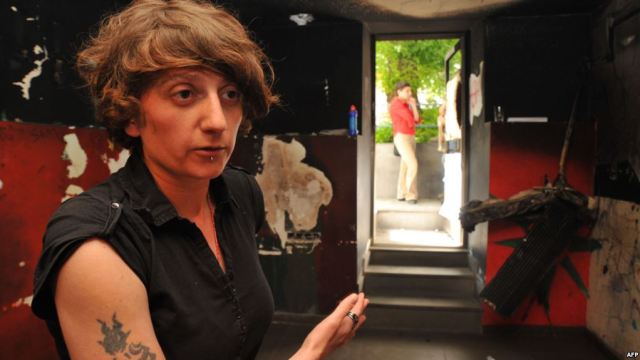
Armine Oganezova, the owner of DIY, an alternative music bar in Yerevan, stands inside what is left of her club after a fire-bomb attack in May 2012. From RadioFreeEurope.
Attempts at same-sex marriage in Armenia and Kazakhstan in the past decade have garnered controversy and awareness about the plight of the local LGBTQ community. In 2006, Harutyun Zhonzhikian, the founder of the Armenian Gay and Lesbian Organization (AGLA), married Misha Meroujan (whom he met through AGLA), both making the trek down from Paris to marry at the Armenian Apostolic Church in Echmiadzin to reflect their still-strong connections to Armenian culture. In 2013 LGBTQ rights activist Vladimir Kornakovsky made headlines by organizing a lesbian wedding in Karaganda, a city in north-eastern Kazakhstan, between Kristina Chernysheva and her partner Karolina. Heartbreakingly, a year later, Chernysheva was found brutally murdered; Karolina has been detained as a suspect.
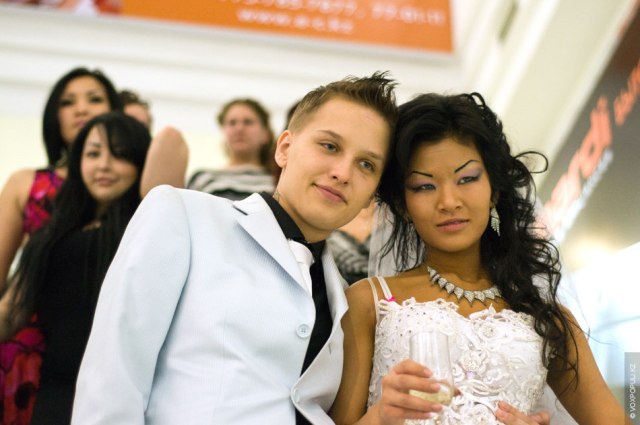
Kristina and Karolina’s wedding in Kazakhstan by Vox Populi
Russia was cited by all respondents as a major influence on the social-political factors affecting their local LGBTQ communities. These countries were formerly part of the Soviet Union and still hold a significant number of Russian migrants.
“For now I think we are not relevant to comment on it [since] Armenia is under the pressure of Russia these years,” said Hovsepyan. “We are too far from equal marriage recognition but let’s keep in touch and probably there will be some development in the nearest future.”
“Kazakh nationalists say it is the Russian influence — Russian colonists brought ‘homosexualism’ [to the] Kazakh steppes in [the] 18th century and before this we had no ‘homosexualists’,” says the kok.team, though a representative of Tajikistan-based organization Equal Opportunities cites Russian influence for the country’s homophobia. “Unfortunately, due to the influence of Russia on the economic, social and political life in the country, the situation of LGBTQ people is not entirely in a good position.” In 2011 Equal Opportunities collaborated on a report on crimes and structural oppression against LGBTQ people in Central Asia with Kyrgyzstan-based organization Labrys and the Sexual Rights Initiative , an international coalition focused on advancing human sexuality rights in the United Nations.
As a result, some in the region don’t even really see themselves as Asian. “We do not have any contacts and ties with the countries of Asia (even there are no flights, connections at different levels, a language barrier, religion, etc),” says Equal Opportunities. “Therefore it is difficult to say, it is possible to affirm that the changes in [other] Asia’s countries cannot affect us in Tajikistan.”
That being said, they still see opportunities for collaboration with others in the continent. “The countries of Asia can share their experience on the development and mobilization of the community, developing health programs, advocacy companies and other activities which can help to unite LGBTQ people here. How to work with governmental organizations, with journalists, etc.” Indeed, kok.team’s earlier recounting of international pressure making a difference on the Government’s attempts to institutionalize homophobia demonstrate the potential power of cross-border cooperation in making a difference for local LGBTQ rights.
Western Asia / Middle East
Coverage of the (truly) horrendous treatment of LGBTQ people in countries such as Saudi Arabia and Iran tend to build assumptions that the entirety of the region is heavily homophobic, especially due to Islam being the State religion for most of the region. However, laws related to LGBTQ people differ across the board — ranging from highly oppressive regimes to relatively open laws for queer and/or trans people.
Most notable in the region for their laws protecting LGBTQ people is Israel, which does have anti-discrimination laws and does recognize same-sex cohabitation. While Israel does not have civil marriage for couples of any gender, they do recognize marriages held abroad, including same-sex marriages. However, much like in some of the Central Asian states, some in Israel do not really consider itself as part of Asia or Asian culture.
“From my point of view as someone who knows well the political condition in my country, Israel is more positioned as European than Asian, with no relation to the geographical map. The country[‘s] goals are to position Israel as part of the free world,” says Chen Arieli, Chairperson of Israeli National LGBTQ Taskforce The Aguda, who also discusses Israel’s political system highlighting their progressive LGBTQ laws regularly in international media coverage. “It is, of course, complicated with our main Arab-Israeli conflict and the occupation, but the close relationship with the United States and to Europe [has] established Israel much more as a main Western world than anything else.” (A Palestinian LGBTQ organization has been contacted for comment but has yet to respond as of the time this article is written.)

Gay demonstration in Zion Square by Brian Negin
In the rest of the Middle East, some are hopeful about Taiwan’s ruling. “Taiwan’s ruling in our favor is a huge step in the right direction and we can only dream of such a reality in the Arab world, even though we know there will always be obstacles from our wider community,” says an anonymous queer woman based in Bahrain. While Bahrain decriminalized homosexuality in 1976, LGBTQ Bahranians are still subject to immense demonisation and state-sponsored violence. “An Asian country embracing same-sex marriage gives us a great deal of hope and much needed encouragement to continue the struggle for our basic rights, not just to exist without persecution but to also marry and build families with our loved ones, instead of hiding in fear.”
Others are less optimistic. “I don’t think the ruling in Taiwan will have a tangible effect on the Middle East. I think we have a long way to go […] Changes need to be from the inside,” says Dana, a trans woman based in Jordan. Homosexuality has been decriminalized in Jordan since 1951 and gender transition was made legal in 2014.
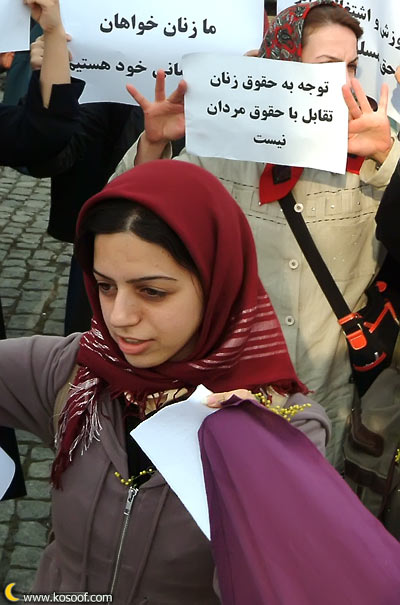
Zeinab Peyghambarzadeh by Arash Ashoorinia
Iranian gender and sexuality rights activist and academic Zeinab Peyghambarzadeh, who has written about bisexual erasure in the Iranian LGBTQ rights movement and who was arrested in 2007 during a protest in support of women’s rights activists on trial, brings up institutionalized homophobia as a core part of their country’s media and political landscape. “I do not have any hope that the formal law and regulations in Iran regarding LGBT rights and even women’s rights can change soon because they are an important aspect of the official ideology of the Government especially in defining this ideology in contrast with the Western modern human rights discourse. However, the Government may stop [the] execution of some discriminatory law for a while, due to internal or international political reasons.” While homosexuality carries the death penalty in Iran, gender transition is legally recognized if accompanied by medical intervention.
Jordanian Queer Muslima, a liberation theology research scholar focusing on gender, racial, and sexual liberation within Islam, questions same-sex marriage as a priority in LGBTQ liberation, even as she is happy for those celebrating the right to marry. “In my opinion, sexual liberation cannot be detangled from racial, colonialist, classist, ableist, gendered, religious liberation. I believe a focus on rulings such as these pinkwashes a movement that seeks holistic liberation in these intersecting fields of oppression.” Citing the various structural oppressions faced by LGBTQ people such as hunger, homelessness, and misogynoir, she asks: “Who decided that equal marriage was the direst demand? Did this decision come from all peoples of the community or just those privileged few? If we truly seek communal liberation, then it is imperative to speak directly to the community — not over it.”
Peyghambarzadeh discusses the priorities of Iran’s LGBTQ community: “Of course, Iran’s LGBT communities are very diverse with different priorities, but in my opinion, decriminalization of same sex sexual conduct and stopping the hate speech against LGBT community can be a priority for different groups because they play a key role in reproducing the LGBTphobic culture.”
“Today Islamic scholars, jurists, leaders, and members of communities are working in many ways to legally, academically, and socially carve a space for LGBTQIA+ peoples. We speak against the dominant discourse that says ‘Islam is heterosexual’ through work in grassroots organizations, social organizing, academia, public protest and living.”
While many may be tempted to cite Islam as the main reason for the Middle East’s institutionalized homophobia, Jordanian Queer Muslima pushes hard against this argument. She argues that before Victorian-era colonization, “Islamic discourse spoke to communities that were gendered and sexually fluid,” citing examples of Caliphates with openly gay children, poems written about bisexual men by female writers, and Islamic jurisprudence handling issues related to their queer children. “Today Islamic scholars, jurists, leaders, and members of communities are working in many ways to legally, academically, and socially carve a space for LGBTQIA+ peoples. We speak against the dominant discourse that says ‘Islam is heterosexual’ through work in grassroots organizations, social organizing, academia, public protest and living.”
Could international solidarity help LGBTQ communities in the Middle East? Peyghambarzadeh seems to think so. “Iranians have more cultural exchanges with majority Muslim countries especially the Middle Eastern ones, and their LGBT friendly media products can reduce LGBTQphobia amongst Iranians.” Jordanian Queer Muslima, however, is more cautious. “Direct and open solidarity now may be counterproductive. Openly LGBTQIA+ people are targeted by community and state alike, but simultaneously our country is homoerotic from some buried identity that has persisted since physical presence of the colonialists.” She brings up Jordanians’ affectionate gestures, such as holding hands and kissing cheeks, which are common between straight-identifying men and women that are “very very comfortable with the same sex but will never allow space for openly homosexual peoples.”
Acknowledging the work of Jordanian LGBTQ people in securing their rights, Jordanian Queer Muslima states: “What we need is the international community to support us in whichever way we deem fit. We know our immediate needs and it might now necessarily be marriage equality and that’s OK.” However, she thinks that solidarity and cooperation should be virtual, never physical, out of concerns for dangers and safety. For her, being able to find community through Tumblr helped her find her community, sparked her interest in Islamic liberatory theologies, and helped her understand that she wasn’t alone. However, she also notes that for others, the needs might be greater: “The realities of a refugee woman, a street child and a Bedouin village girl can never be the same and will not have the same needs.”
Next: South Asia and Southeast Asia
South Asia
The South Asian region has seen a lot of changes in their legal recognition of LGBTQ people in the past decade. Most of these changes have focused on gender identity, with Bangladesh, India, Nepal, and Pakistan recognizing “third genders” and/or gender transition.
Nepal in particular, the only country in the region to decriminalize homosexuality, has come very, very close to beating Taiwan to legalizing same-sex marriage in Asia. After a writ petition demanding civil rights, anti-discrimination laws and reparations to LGBTQ Nepalis was submitted by the Blue Diamond Society and other LGBTQ rights organisations to the Nepali Supreme Court in 2007, the 2015 Constitution prohibits discrimination against LGBTQ people — but did not include any provisions for same-sex marriage. Specialized task forces are still hard at work at implementing same-sex marriage and protecting LGBTQ Nepalis from the violence and discrimination they still face on the regular; meanwhile, Nepal is starting to sell itself as a tourist destination for gay weddings. (Blue Diamond Society and other Nepali LGBTQ activists were contacted for comment but none had responded at the time of writing this article.)
India very nearly decriminalized homosexuality in 2009 through the repeal of Section 377, a British colonial law forbidding “carnal intercourse against the order of nature” that still exists in the books of former British colonies in South and South-East Asia, by the Delhi High Court; however, Section 377 was reinstated by the Supreme Court in 2013, who declared the repeal a “judicial overreach.” While LGBTQ communities and rights are gaining visibility in India, including India’s first and only openly gay royal Prince Manvendra Singh Gohil working on campaigns promoting safer sex and HIV/AIDS education, responses to Taiwan’s ruling have been decidedly mixed.
Annie, a representative of the Sangini (India) Trust for LGBTQ women in New Delhi, was delighted to hear about Taiwan’s ruling. “Being the first country in Asia to legalize same-sex marriage is a big step ahead for the continent,” she says. “We are hoping that more countries would follow suit and support its LGBTQIA communities.”
Other respondents were less sanguine. “Taiwan’s law is path-breaking and their law makers are torch bearers but it will have very less impact on India,” says intersex and genderqueer activist and Commonwealth Youth Worker Award recipient Gopi Shankar Madurai. Self-described “Brown Trans Dyke” Rae adds, “India continues to be insular as always. Our local queer politics are also in [such poor] state that the ruling in Taiwan does not register as much of a victory at all. India is about as xenophobic [with regards to East Asia as China is to [South Asia / Southeast Asia], but the media does not pay much attention to their governmental happenings that much.”
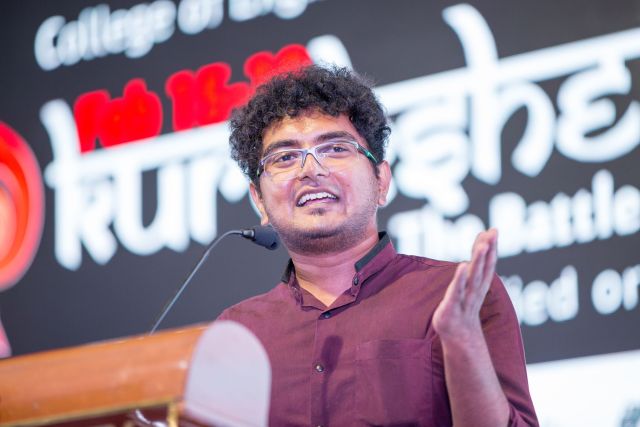
Gopi Shankar Madurai addressing the students of CEG Anna University Tech Forum
Claims of India’s insularity stand in contrast to sentiments expressed by the Acting Chairperson of Bangladeshi LGBTQ magazine Roopbaan, who is currently based in the United States for personal safety after the murder of their editors Xulhaz Mannan and Mahbub Rabbi Tonoy last year. Talking about how Bangladeshis complained to BBC Bangla about their coverage of Taiwan’s ruling “making people gay”, similar but not as intense as the complaints levied towards Roopbaan, he commented: “Funny thing is if it was India, Pakistan [or] Nepal, people [would] react differently than [they did about] Taiwan.” Indeed, bigger than Taiwan in Bangladesh news was the very recent wedding of British Bangladeshi Jahed Choudhury to his partner Sean Rogan, the first same-sex wedding in Britain to involve a Muslim — which, according to the Roopbaan Acting Chairperson, led to controversy about the United Kingdom “destroying Islam” and questioning the idea of Muslims being gay.
Both Annie and Rae brought up the current political climate as major factors affecting the treatment of and support for LGBTQ people in the region. “Although the visibilization of the community has increased through efforts in the movement, but still we have a long way to go,” says Annie. “Especially in the current political climate, there has been lesser and lesser support of the movement and several allies have gone silent even for supporting. It has become about how to tiptoe one’s way around the ‘valid’ issues so we can talk about the community.”
Rae was more pointed in her criticism of Indian politics. “The problem is that right-wing sentiment is very entrenched in India right now — solidified with the Modi Government,” she explains. “He’s disguised a conservative agenda as a progressive one. He’s pitted his own ‘economic-focused’ policy platform against the ‘frivolity’ of socially-liberal platforms like those of the AAM [Centre-Left political party Aam Aadmi Party] or Congress.”
Rae feels that the prioritization of economic concerns over social concerns — the idea of “we have better things to worry about” permeates much of Asia’s insularity, especially around LGBTQ issues. “In India as elsewhere, economic ‘concerns’ are used to disguise conservative agendas as ‘practical’ or progressive agendas as ‘fanciful.’ The mentality is the problem, not our actual agendas.”
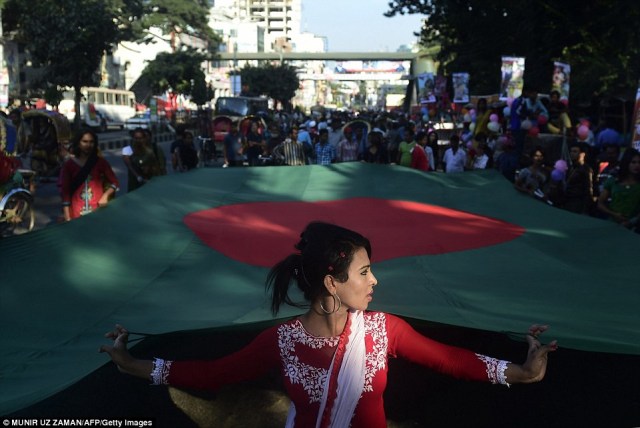
Transfemme participant in Bangladesh’s Hijra Pride 2014 by Munir Uz Zaman/AFP/GettyImages
The Acting Chairperson of Roopban is conflicted about whether Taiwan, or even Asian Muslim-majority countries like Malaysia or Indonesia could be of help to the Bangladeshi LGBTQ community, which has seen a spate of incidents such as the mass arrest of 27 gay men in May or the suicide of the moderator for a support group on Facebook, one of the main avenues for LGBTQ Bangladeshis to find support and community. “Definitely they have a lot of resources which we can utilize, but it’s more like our social-cultural situation. The most difficult thing [as a] Muslim-majority country [is that] they don’t want to go with a logical argument, they just want to hack [you] to death since [you are] not like them.” Other Muslim-majority countries could provide a frame of reference for Bangladesh on dealing with LGBTQ issues and people in the country, but right now the prevailing perception is that “LGBTQ issues are [of] Western influence which [is] destroying our culture, but they never accept that we have a long LGBTQ culture in our society.”
For LGBTQ Bangladeshis, and likely those elsewhere, personal safety and mental support has been key in ensuring the survival of their community, and media reports both positive and negative have raised the awareness of the existence of Bangladesh’s LGBTQ community. “Our community is brave and our people [are] very understandable,” says the Roopbaan Acting Chairperson. “People believe and love and respect love. We just need that support from all.”
Southeast Asia
Southeast Asia, like the Middle East, runs the gamut on laws affecting LGBTQ people. Homosexuality has been decriminalized in Timor Leste, parts of Indonesia, the Philippines, and Thailand, while there have never been laws against homosexuality in Cambodia, Laos, or Vietnam. Indeed, as Cambodian LGBT community organizer Sokdom, explains, “[the] Civil Code has been passed in 2007, which has been applied in 2011, removing [the] prohibition of same-sex marriage in Cambodia. However, the law [still] mentions that marriage should be between ‘female’ and ‘male’.” Some Cambodian government officials have expressed their support for same-sex marriage. There has been one recorded case of a legally recognized same-sex marriage in Cambodia: in March 1995, between Khav Sokha and Pum Eth, two women from the Kandal province.
Prior to Taiwan, Vietnam too was in the international news as an Asian country negotiating same-sex marriage, repealing laws prohibiting same-sex marriage in 2015. Decriminalizing same-sex marriage isn’t the same as recognizing same-sex marriages legally, however, and such legal measures have not been enough to combat violence faced by Vietnamese LGBTQ people, especially youth . (LGBTQ activists and organizations based in Vietnam were contacted for comment but none responded at the time of writing.)
Laotian LGBTQ activist Anan Bouapha, who has organized Laos’s first Pride Proud To Be Us since 2012, feels that the lack of laws reflects Laos’s cultural values of “living together peacefully”. “The LGBT community lives their life happily and hardly encounter any severe hate crimes like it’s happening in many corners [of] the world.” However, there are still difficulties talking about LGBTQ issues openly in Laos, possibly because some of the population find homosexuality “still unbearable”. “So, we are in the gray area, which means that there’s a way to advocate for acceptance, but it has to be [a] very local approach, not using a [W]estern ideology in this unique environment.”
Tailoring LGBTQ advocacy to the needs of the local community is very important for the ASEAN SOGIE Caucus, a collective of LGBTQ activists from eight South-East Asian countries formed at the ASEAN Civil Society Conference in Jakarta, Indonesia in 2011. Advocacy and Communications Officer Cornelius Hanung explains: “Within the South-East Asian context, we are very careful not to put the message of marriage equality in our works because we don’t want our stakeholders (and oppositions) [to] see it as the ultimate goal of our struggle.” Hanung says that while Taiwan’s ruling may positively impact countries like Vietnam and Cambodia, which are already making strides towards marriage equality, it may be detrimental to countries such as Malaysia, Indonesia, Singapore, and Brunei Darussalam that are still far from according civil rights to LGBTQ people. LGBTQ people are subject to imprisonment, fines, caning, or even the death penalty in Malaysia, Singapore, and Brunei Darussalam; meanwhile, while homosexuality is decriminalized in most of Indonesia (except for the province of Aceh, which publicly canes gay people), police raids and lawsuits from organizations like AILA (Aliansi Cinta Keluarga or The Family Love Alliance) aiming to criminalize LGBTQ activity have placed LGBTQ Indonesians in a very precarious position.
“Many lesbians are forced to marry men. Women aren’t seen as perfect or complete without marrying men.”
Cultural norms around gender and family play a major part in the treatment of LGBTQ people in the region. “There’s a lot of expectations going on to construct foundations of families, carrying on the family name, producing offspring and the stifling adherence to societal expectations of what constitutes success both within the work sphere and ticking checkboxes and the correct ambition makers. More so for Asian culture rather than Western, kan?” explains Malaysian queer woman Kay Lee. In recent years the Malaysian Government has claimed that LGBT rights are “deviant” and “against Islam,” held seminars helping teachers and parents to ‘identify homosexuality’ in children, and even sponsored an anti-LGBTQ musical. “The shame and stigma here is tenfold when that’s not fulfilled, and that path towards building that traditional family unit like our parents and forefathers always have simply crumbles when we are LGBTQ – either because our partner will be of the same gender, or we have difficulty adopting children, or because we are a different gender than what’s on our birth [certificate].”
Women in the region are especially affected by such expectations. “Since I became the Women’s Representative for ILGA Asia, I’ve seen that many places in Asia hold similar patriarchal traditions,” says Indonesian activist Poedjiati Tan. “Many lesbians are forced to marry men. Women aren’t seen as perfect or complete without marrying men.” For Tan, Taiwan’s ruling could help lessen the pressure on queer women. “When there are examples of marriage not needing to be with men but also with women, the pressure on women to build families will be lessened.”
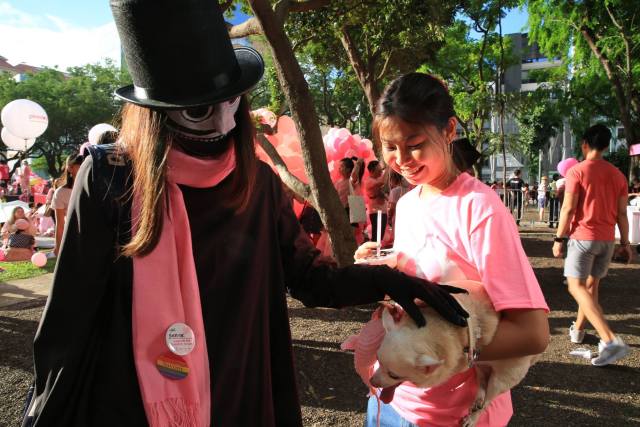
The Babadook shows up at Pink Dot, Singapore’s main LGBTQ event
The attitude of LGBTQ identities as a ‘corrupting influence from the West’ is prevalent in the region, making LGBTQ people convenient scapegoats. “Our basic rights as human beings are often stripped off of us on a daily basis: to simply exist as an open LGBTQ person in Indonesia is a struggle in and of itself,” explains media analyst, translator, and writer Fajar Zakhri. “There’s a very strong Don’t Ask Don’t Tell mentality in Indonesia, and a persistent public confusion between homosexuality and pedophilia, which is funny in its idiocy if you ask me. It’s very much, like, it’s OK if you’re gay but don’t flaunt it.”
“Everything in Brunei is not revealed — there are subtexts and cracks in our society. That includes sexuality, depression, suicide, lesbians, and gays. They exist but we just shouldn’t acknowledge it,” adds Bruneian filmmaker Abdul Zainidi, who created Brunei’s first LGBTQ film Haram Queen, about the local drag queen scene existing in a country with extremely strict anti-LGBTQ laws. “That being said, my films are not there to denounce my country — instead, I beautify it through the unusual.”
Kay Lee points out the ease in blaming supposed ‘social ills,’ from drug addiction and promiscuity to the sheer existence of LGBTQ people, on something “unMalaysian, unAsian and removed from our culture.” “If they originated or were also derived from people from an Asian culture (I mean, just look at the people in non-urban areas who are LGBTQ without much access to Western media) then that would mean the problem doesn’t come from the Western media, and that LGBTQ people can be fostered and born into any family, right? Can’t have that. Must find [an] easy way to scapegoat the untouchables.”
Religion also came up as a major factor amongst respondents in South-East Asia. “Obviously a lot of it has to do with the fact that we’re a religious country, with a heavy emphasis on Islam, and the popular notion is all religions are against the concept of LGBTQ, which of course is untrue,” says Fajar. “I’m inclined to agree. Conservative Christians are also a very formidable group in Indonesia,” adds Dede Oetomo, founder and webmaster of Indonesian LGBTQ community organization GAYa Nusantara.
Indeed, as Australian queer feminist activist and Women’s March Jakarta organizer Kate notes, these religious assumptions may affect the way Indonesians view Taiwan’s decision. “Many Indonesians do not know much about Taiwan to begin with and most are likely to claim that Taiwan is different because it is not particularly religious. […] The argument will be “That might be fine for them, but we are Muslim/Catholic/Protestant and LGBTQ is now allowed by our religion.”
Fellow Indonesian Maria C. F., who co-founded Diversity LGBT+ at the University of Nottingham in Ningbo, China, pushes back against both the idea of Taiwan not having to deal with religious or cultural stigma and, echoing Jordanian Queer Muslima, about Islam being a barrier to acceptance of LGBTQ people. “According to a poll conducted by Taiwan Alliance to Promote Civil Partnership Rights (TAPCR) in 2013, around half of Taiwanese support same sex unions whereas 75% of the opposition came from the Christian community. In addition, there are also Taiwanese who oppose same-sex unions on the grounds of upholding traditional Chinese family tradition,” she notes. “Therefore, if the same logic is applied to Indonesia then I think ‘Islamic teaching’ is just a short-sighted excuse to justify homophobia and transphobia. The fact remains that there are prominent Muslim figures in Indonesia and overseas such as [Indonesian women’s rights activist] Dr. Siti Musdah Mulia and [Mayor of London] Sadiq Khan who strongly support LGBT+ rights.”
Indeed, as Timor-Leste LGBTQ organization Hatutan Youth demonstrated when they organized the country’s first Pride in July, having a significantly religious population does not need to be a deterrent in advancing LGBTQ rights. “It takes courage to organize such an event in a Catholic majority country who has only gotten independence for 15 years,” says Chief Coordinator Natalino Ornai Guterres, who discusses both the negative and positive responses they received about Pride, including a message of support from the Timor-Leste Prime Minister Rui Maria de Araújo.
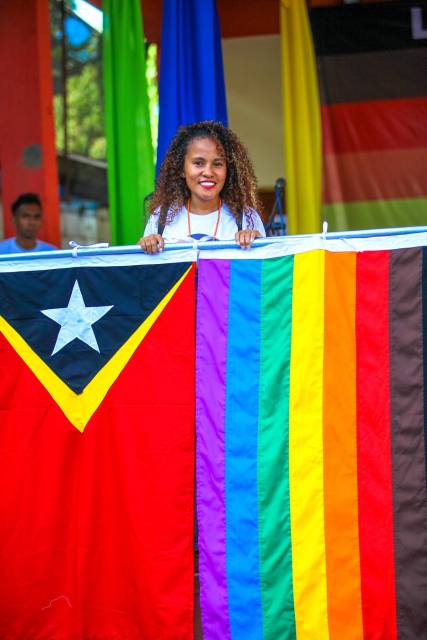
BenNhy Ghurro Rocha at Timor Leste Pride 2017 by Hatutan
Southeast Asia has one of the largest Chinese diasporic populations, with the Chinese making up the dominant race in Singapore and being part of the “Main 3” in Malaysia and Indonesia. Would Taiwan’s ruling then have a larger impact on Chinese LGBTQ locals compared to those of other races? Possibly. My respondents mention locals with Chinese heritage joking about moving or holidaying to Taiwan to marry, though even if they follow through it would be at best a symbolic gesture.
For some in the sub-community, the ruling provided a powerful moment of representation. “The Malaysian Chinese see themselves in the Taiwanese Chinese lens. Suddenly, it seems possible. We can pass, we can leave and blend in there,” says Kay Lee. “Representation is such a strong thing. When our Malay and Indian brethren look at couples and pairings who got married there who don’t exactly look like them, it’s harder to visualize leaving and being free to be with whomever you choose. It’s harder for them to think, ‘I deserve love and happiness and to be who I am,’ I reckon.”
However, the ruling might end up being weaponized against the Chinese community, especially with the already existing demonization of Chinese people being an “unwelcome bridge that propagates the sins of the liberal West” (according to Kay Lee) through drinking, clubbing, and pork consumption. “Sinophobes in Malaysia would have more excuses to use the awful phrase ‘pergi balik Cina’ [go back to China],” adds fellow Malaysian queer woman Nana.
Would the wider South East Asian LGBTQ community, regardless of ethnic background, be helped by Taiwan’s ruling? Opinions are mixed. “I don’t think that the decision in Taiwan will have much impact in Indonesia, although it might motivate activists by showing that there is a bit of good news out there after all,” muses Kate. “Other than that it almost certainly will not affect policy or the law. The average Indonesian will probably raise their eyebrows at the news, but then move on.”
For Guterres, while Timor-Leste is considered “a champion of human rights in the region” due to laws in support of LGBTQ people, marriage equality is not as strong a priority due to strong Catholic and cultural associations around marriage. “At the moment our focus is to promote the message of respect and acceptance — which was our theme for this year’s Pride event — and to call for the prevention of violence and discrimination against LGBTI people, and to give hopes to those who still struggle to feel accepted in schools, at homes, and on the streets because of their differences.”
“There are people who think [marriage equality] isn’t needed in Asia since many are closeted — however, I feel that some are getting their way onto feeling the same rights they want in Asia. Doesn’t mean they think it isn’t necessary but it just requires a slower process,” adds Malaysian queer woman Christy Yang. “Some might feel equal rights or marriage isn’t in their dominating reasoning since their mindset might be more towards a quiet commitment instead of an open relationship for everyone to know.
“Taiwan just showed to all Asian fellows that same-sex marriage is not a Western influence, but it’s about human beings.”
Tan and Bouapha are more optimistic. “While this is a very sensitive subject in Islamic countries, this is still a moment of hope for the future,” says Tan. “Legal recognition will provide benefits for lesbian relationships, such as insurance, inheritance, and the rights for partners to sign off on actions recommended by doctors while their partner is ill.”
For Bouapha, the decision is a moment of celebration. “Taiwan just showed to all Asian fellows that same-sex marriage is not a Western influence, but it’s about human beings.”
Next: East Asia
East Asia
Compared to the rest of the continent, East Asia may be seen to be most accepting legally of LGBTQ people. Every country and administrative region in this subcontinent (China, Hong Kong, Japan, Macau, Mongolia, North and South Korea, and Taiwan) have either decriminalized homosexuality or — in the case of Korea — never criminalized homosexuality in the first place. Gender transition is also recognized in most of the region, with most countries requiring surgery beforehand. However, just like Central Asia, decriminalization does not necessarily mean safety. Anti-discrimination laws are not commonplace, same-sex marriages performed overseas aren’t necessarily recognized, and — similar to South East Asia — cultural norms hold a sometimes larger influence on the treatment of LGBTQ people than the legal system.
“There is no ‘massive cultural stigma’ against sexual minorities (a popular way to term the LGBTQ community in Japanese, sometimes shortened to ‘sekumai’). Rather, there is the general rule of ‘the nail that sticks out gets hammered down’ which states that anyone who doesn’t ‘fit’ will be pressured or metaphorically beaten into conforming,” says Loretto, President of Stonewall Japan, which connects international LGBTQ people based in Japan.”Queer Japanese people are already taught to keep their personal relationships on the down-low so that isn’t really felt as too much of a pressure.” Their description of Japan’s “Don’t Ask Don’t Tell” model for personal matters mirrors Fajar’s experience of her experience in Indonesia.
As Loretto notes, Japan already “has the ball rolling” when it comes to marriage equality, as a number of municipal jurisdictions have already allowed for “partnership certificates” for same-sex marriages. Even so, the process of getting cities on board with such certification is long and complex. “My city, Sapporo, just recently got the right to apply for partnership certificates but there were months of meetings about the pros, cons, feasibility, and even the desirability of partnership certificates,” explains Loretto, citing concerns such as potential high costs, lack of actual benefits, and divorce.
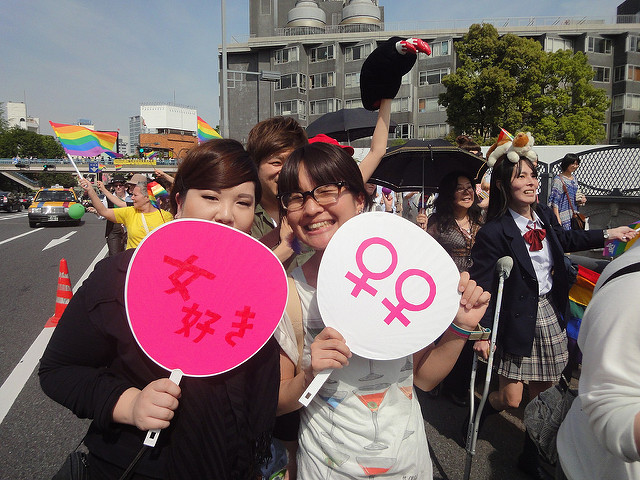
Tokyo Rainbow Pride 2012 by Lauren Anderson
Anaraa Nyamdorj, Co-Founder of Mongolia’s LGBT Centre, draws some comparisons between South East Asia and East Asia. “I do believe that for a lot of South East Asian countries […] they’re still battling colonial heritage of draconian laws criminalizing same-sex consensual sex. For other Asian countries where our identities are not criminalised, most of us are still battling for full equality, for non-discrimination, and of course, although equal marriage is one of the main equality causes, rampant hate and violence, unemployment [and] poverty are all too real issues for us that need immediate attention.” The Centre faced immense issues in its early years due to concerns over their name “conflicting with Mongolian customs and traditions,” but they were allowed to register in 2009 and hosted their first pride in 2013.
Loretto does not believe the idea of LGBTQ identities being a Western invention is particularly representative of Japan, though interestingly they do note the use of English and Western concepts of gender and sexuality amongst LGBTQ people in Japan as a means of defining identity and educating others. “Most older Japanese terms are misleading or utterly inadequate in describing queer Japanese people’s experiences. I’ve never heard a queer Japanese person ever use a wholly Japanese term to identify themselves. There are certainly instances where we don’t have a word (ex. ‘fujoshi’, BL [‘boy love’]-loving girl), or they adapt an English term (ex. X-gender which is their equivalent of genderqueer/nonbinary/neutrois) but overall it’s been readily welcomed into their lexicon, culture, and identity.”
Taiwan’s marriage equality activists themselves had to battle with cultural norms denying the possibility of LGBTQ rights co-existing in Taiwan. One particularly effective tactic involved diving into local LGBTQ history. Chu-Yuan Teng from Marriage Equality Coalition Taiwan shared with Autostraddle a couple of news articles about historical attempts at same-sex marriage in Taiwan, both involving lesbian couples; one from the Taiwan Daily News in 1912 about a couple who ran away and eloped after the encouragement of one partner’s brother, and another from United Daily News in 1958, where another couple wrote to the Taiwan District Court asking for permission to marry, only to be turned down.
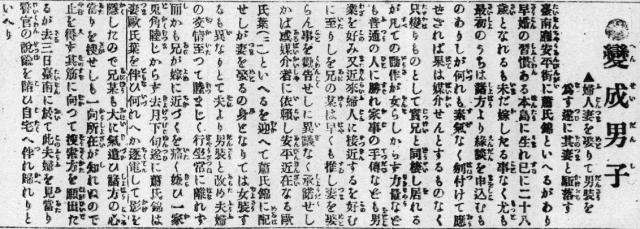
Article from Taiwan Daily News, 1912.
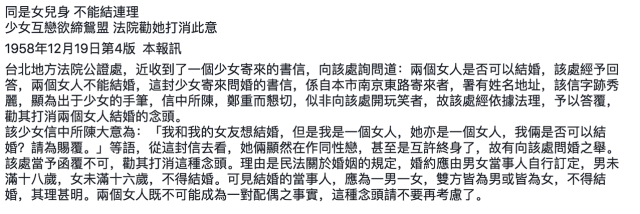
Snippet from United Daily News, Dec 19 1958.
“Telling those stories about same-sex couples from [a] long time ago is what I will usually do when facing cultural challenges,” explains Teng. “From these stories, I tried to express that though Taiwan does have [the] Chinese cultur[al] background, our society is also open to multi-families.”
These efforts do have follow-on effects on other culturally similar countries, especially China. “Legalizing same-gender marriage can eliminate the gender norms from the law system of China and it will relieve stress from gender norms for everyone in China,” says Chinese gender and sexuality activist Li Maizi, part of the ‘Feminist Five’ that was arrested in 2015 for ‘provoking trouble’ and currently working as a coordinator for Rainbow Lawyers which works to promote LGBTQ rights in China. Li quotes Chinese Academy of Social Sciences sociologist Li Yinhe, stating: “Taiwan’s ruling proves that same-gender marriage is acceptable in Chinese culture, and is likely for the Chinese mainland to legalize same-gender marriage [within] a decade.” China’s LGBTQ community gained international attention in the last few years for so-called “sham marriages” between gay men and lesbian women, usually held to appease familial pressures while still maintaining their own queer relationships outside the marriage.
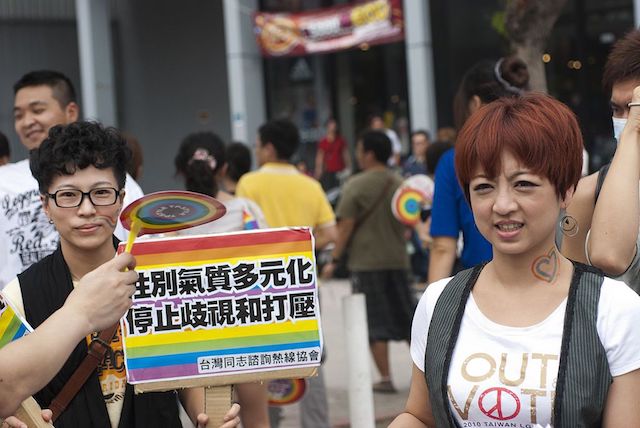
2011 TW-KHH 2nd LGBT Pride: Out & out by Shih-Shiuan Kao
Teng hopes that their efforts will be a source of inspiration for the rest of the continent. “Maybe things are more complex in some other Asian countries, due to different racial or religious histories. But just like we’re inspired by the experiences of France or USA, I also think the trend of legalizing same-sex marriage will bring some effect to them.”
In Summary
It’s clear that Asia’s immense cultural diversity and historical context brings with it immensely complex challenges and opportunities for its LGBTQ communities, whether their countries are more accepting legally and/or socially of their identities or are much more severe with their oppression. Taiwan’s ruling can serve as an inspiration for some to continue their efforts, but local needs and contexts will always take precedence.
That said, as Taiwan demonstrated, change is possible. As Nyamdorj stated: “As someone who’s been an LGBTI rights activist for the past 20 years, I can say that any progress anywhere around LGBTI rights has a direct, aspirational and inspirational impact on our community, giving us a push to strive for the same in our local contexts. Just because we’re Asian, it doesn’t mean that we have different ideas of love, commitment or cohabitation: they are [the] same because we’re human beings, and as human beings we want our love to be recognised, we want our relationships to be recognised, for us to have the same rights as straight, cis people.”
Special thanks to Yenni K, Jameel from My.Kali Magazine, Songket Alliance, and all respondents for their help.
Pages: 1 2 3See entire article on one page



Wow, this is so much to unpack! Thank you for bringing us these perspectives.
Thank you! I definitely learned a lot doing the research for this article. Plenty to unpack indeed!
Thank you so much for putting this together.
Thank you for reading :)
This is really impressive in its succinctness – you manage to touch upon so many intricacies related to complex geopolitical and cultural issues and intersections. I’ll be referring back to this often!
Awesome! Glad it was helpful!
I always love Autostraddle’s international coverage. A hearty thanks to both you and your brave contacts.
One of my main goals as a newly minted Staff Writer is to bring in more international perspectives and I’m really glad Autostraddle is giving me the space to do so! And yes, my contacts are amazing. Some were hella chatty, some were more reserved, but they were all really generous.
I haven’t been back to Vietnam in so long, but according to my friends there, it sounds like people are more okay with LGBT. Doesn’t mean smooth sailing though. The mentality of most people there is live and let live, people still talk behind your back and all; violence is mostly against those that appear vulnerable and easily preyed on (thugs mentality, like anywhere).
The prevalent norm is one is expected to get married, and have kids. So the concept of same sex relationship and marriage is not quite accepted there (yet). SS relationships are almost always met with the “but you have to get marry and have kids” argument.
But as more people are openly LGBT, the topic is more tolerated, and hopefully one day it’ll be just another norm.
Yeah it seems that culturally it’s relatively more open to LGBTQ people than their neighbours, but it still has quite a ways to go. The idea of “but kids!” came up a fair bit with people I interviewed in that region – one of the Indonesians talked about how the ruling could help women especially deal with societal norms around gender and marriage.
Thank you for this article and including Central Asia. Did your research on Central Asia also includes the Middle East/West Asia, or is the record in that area, minus one country(maybe) pretty bad there?
I find it very odd that a lot of anti-lgbtq people say it’s western world that introduced us to them, when in fact in places like India, Pakistan, and Bangladesh it was the British Christians who introduced homophobia and criminalized their culture. The Hijra specifically, which I am told also may have existed in neighboring countries to the west of it, after the Persian Empire and before Soviet rule.
I did actually include the Middle East in there, I’m not sure why that section is missing!
I just assumed it was in Central Asia as I saw our neighbor(at least to Iran) Armenia mentioned as was a few countries that was part of the Persian empire.
No, it was its own section, I had a few interviewees there. I’m trying to find out if I can paste what I’ve written for that section here!
Ah okay. Thank you very much for writing this and actually including us Middle Easterners/West Asians countries as many times we are looked over in discussions like this.
Refresh the article, the section is back! :D
Thank you!
Thanks for this article, it’s great to hear such a variety of viewpoints from a range of countries.
Thank you! And yeah, I definitely wanted to get as wide a breadth as possible.
This is incredible research… this must’ve taken so much time and effort. I am very impressed
thank you so much
I feel like you are one of the most relevant people to comment based on your username, haha
Hahahah
No, but seriously, you did an amazing job and you should be very proud
Thank you so much for this article.
I was hoping to read more on Thailand though, especially since there has been a push for same-sex couples to be legally recognised in the last few years.
By the way, I find it puzzling that an article from the Taiwan Daily News would be in Japanese??
I did reach out to a couple of people & organisations in Thailand but none of them replied to me in time unfortunately.
And Taiwan used to be a Japanese colony! Hence the article being in (apparently very archaic) Japanese.
Ah, that’s too bad. I did find it interesting that Malaysian Chinese found encouragement in the Taiwan’s ruling. As a third generation Chinese in Thailand, that didn’t occur to me. I was happy for Taiwan and cautiously hopeful that this would lead to changes in other countries in the region as well. Bangkok is holding our first Pride parade in 11 years so that’s something! Hopefully this will pave the way for Thailand having actual laws that recognise and protect LGBTQ people instead of just having an LGBTQ-friendly image.
Ahh, that explains it, thank you lol. Also explains why I could read the words and had a very hard time understanding them.
There’s Middle East/West Asia too? Wow!
There is now!!
Super interesting, thanks Tiara! I’m very excited about your work as staff writer this far & can’t wait for your future writing.
Thank you! :)
What’s the current climate in Turkey? I have no idea how the climate might be shifting these past 2 years
I didn’t hear back from anyone I contacted in Turkey. Hopefully a Turkish reader can chime in?
I think one small correction about Iran, gender transition is legally recognized if you are straight trans person. If you are bi, queer, or into another gender, then they usually deny you. Plus, the awful fact of if you L or G they will give you the option of transition and be straight, denounce being l or g or die. The religious leaders like to claim they don’t have gay people because of this. I saws this nearly a decade ago on a youtube video. The video also said we are number 2 behind Thailand in the world when it comes to people transition getting transition surgery(because of forcing cis people to transition to become straight). I had a friend tell me Iran has a contracts or something of the sort with Thailand, where many trans women/amab trans people get bottom surgery done; and one with South Korea for adams apple surgery if one wants. It seems like Thailand & S.Korea are were all the surgery places are for trans women are as I’ve meet a few who been to on or either country for such reasons. On the other hand Iran is(at least in 2015) number one in the world when it comes to nose jobs(and all of people I know who had one was due to medical reasons not cosmetic).
Absolutely! The politics of gender transition laws are just as complex, if not more so, as laws around homosexuality.
Thank you so much for this article. Looking forward to more international stories.
Thank you! That’s certainly something I aim to bring to the table.
Thank you for this article
Thanks for reading!
This is such a great article.
Thank you for putting so much work into this Tiara- this is such underreported information, and I’m so glad to have you reporting on AS. This is exactly the kind of content I was hoping for more of. It’s fantastic to finally be getting a wider perspective beyond just N. America.
Thank you thank you thank you!!!
Thank you! This is exactly why I was keen on the staff writer role – more opportunity to write about issues like these beyond the US.
Hello!
Thanks for this. It gave me a much wider understanding of the area.
Interesting that:
a. The Asians think they are all so very different and yet, marriage and raising family is a very huge concern for most of them. I mean, I am pretty sure, Indians would never consider that they have anything in common with South East Asia; and we are pretty racist about them (and about Africans, and at times, whites too); and yet, the basics of culture is much the same.
b. Some do not want to be considered Asian at all.
c. A lot of folks think that homosexuality is a colonial or western invention while the truth is that it is colonialism that brought homophobia to this land (well, mostly). Homosexuality was not criminal in India until the Brits came in and now, we are stuck with that law.
By the way, while PM Modi’s party (BJP) is following a very troubling Hindu Nationalist Agenda–or ignoring anti-women, Anti-Dalit and anti-Muslim violence–the section 377 was reinstated in the reign of Congress and the attorney for reinstating was government’s. And to consider Congress any more liberal than BJP when they had issued very troubling legislation in the past is not right. Most parties in India behave the same way–they oppose the same laws as opposition that they promoted while in government. Many BJP legislation were first introduced by Congress when they were in power. Nobody seems to have any specific party platform except to attack the opposition. But, BJP has a history of promoting islamophobic and anti-west (cherry-picked) propaganda although, it was not that propaganda that won the election for it. It was sidelining or not speaking about that propaganda.
However, both the RSS leader (mainstay/grass roots part that feeds BJP) and our Finance Minister have come out saying that homosexuality is not a crime and shouldn’t be criminalised. Of course, nobody has done anything to actually decriminalise homosexuality; but I still consider these public announcements heartening.
One of our earlier ministers of state (from Congress) tried to introduce legislation (individual member bill) decriminalising homosexuality but barely anybody was there in parliament, so the bill was not passed. Though of course people said later that they are not really against homosexuality. I find their reluctance to actually come out against homosexuality completely, when a few years back they were against it, heartening.
With respect to Trans rights. I think it is moving along faster. People/Courts are discussing protection against discrimination. We have transgender college principals (principals are like deans, I think) and transgender municipal members (politicians).
Also: MNCs in India are for LGBT equality. At least, my company is; we had a pride day and bring your whole self to work and such things. And our country chair has been regularly holding townhalls about the cause. I had asked in one of these about doing something in the public arena–because my company was among the 70 or so companies that had filed amicus brief in favour of same-sex marriage with US SC in the Obergefell case. The country chair said that while any action in political/public sphere is not an option right now, they are applying pressure in business forums on other more traditional businesses to follow suit. I was very happy to hear that.
Most of mainstream media (English) has been consistently in support of the LGBTQ community.
I read about Taiwan and was happy for it; but I don’t think Taiwan will have an effect on our rights. Only internal activism will help. It might help if Pakistan allowed it though. :)
Hi and thanks for the additional context on Indian politics! It’s greatly appreciated.
Point (a) was a significant part of the initial inspiration for this piece (“hmm I wonder how this squares with Asian cultural norms”) and it’s been really interesting to see what’s similar, what’s not similar, and what is actually similar without people wanting to recognise it. A lot of these countries think they have nothing to do with each other but really they have a lot they can relate to! And yet also a lot of uniqueness that doesn’t get highlighted anywhere else (hardly anybody else talks about Central Asia, for instance).
Thank you so much for putting this together! It’s wonderful to hear about progress spreading so widely, even if our various social barriers get in the way.
I’m also very happy with the increased international coverage. Are there any “hub” sites (other than AS) you would recommend for more international LGBTQ+ news?
Now to go plan my international Pride travel… <3
Hi! As far as hub sites go – not that I know of, really. A lot of this was found via word of mouth, looking up relevant organisations and reaching out to them, and Facebook groups. Local news sources do report on LGBTQ news on occasion and there are a few country-specific LGBTQ news organisations (a fair few of the people I interviewed are part of orgs that do this kind of thing). But asides from Autostraddle and the LGBTQ verticals of places like Buzzfeed and HuffPo I don’t think there’s really an International LGBTQ News Hub as such.